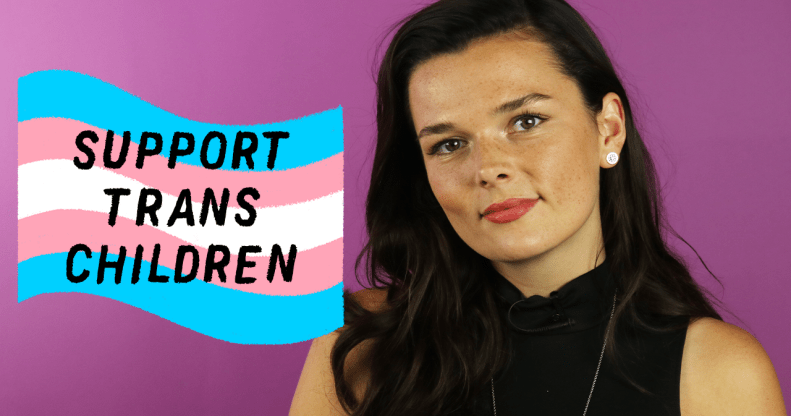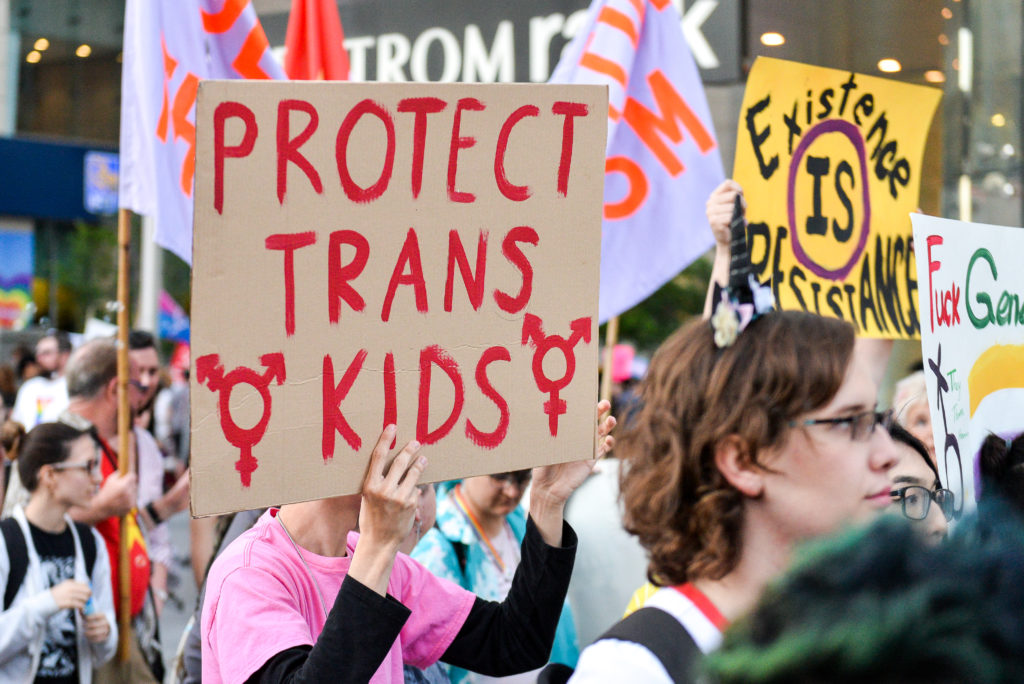Trans model Maxine Heron explains why you should support your transgender child

Transgender model Maxine Heron says her parents’ support made all the difference (PinkNews)
Transgender model Maxine Heron came out age six to her mum. Her parents accepted her and their support gave her the courage to transition, feel confident in embracing who she is, and now she’s a proud trans model.
“I always knew that I was a girl,” she told PinkNews. “I first kind of put it into words with my mum when I was six years old.
“And I think it came as no surprise because as soon as I could start to express myself I would always do so in a way that was really female.
“And it was more than just being effeminate or an eccentric, flamboyant kid – I just was always kind of her daughter.”
Watch trans model Maxine Heron share her coming out story:
Although her coming out was unexpected, her parents reacted very positively, she explains.
“She greeted that news with a lot of love. And I think it was something neither of my parents ever expected to have to deal with,” she tells PinkNews.
“It was really positive, I was very lucky. Both my parents were unconditionally and fearlessly supportive of me – it was amazing.”
Now, Heron is an out and proud trans model getting more bookings than ever.

Transgender model Maxine Heron says her parents’ support made all the difference (Maxine Heron)
Transgender children don’t need to be told they’re wrong.
As anti-trans rhetoric grows among groups such as the so-called LGB Alliance, Heron stresses the importance of simply listening to your transgender child and remembering that trans children are not a danger.
“They’re coming from a place of bias because, actually, they don’t know what this is like and if they did, they wouldn’t be campaigning for the things that they are,” she explains.
“We’re talking about kids that really don’t need to be told they’re wrong on such a regular basis.
“What harm is it if someone wants to explore who they are in some way? It’s nobody’s business apart from theirs.”
What to do if your child comes out as transgender:

Trans march in Ontario, Canada, 2019. (Anatoliy Cherkasov/SOPA Images/LightRocket via Getty)
“When your kid presents to you exactly how they are, there’s no changing it, you just need to follow their lead on it,” she says.
“And it doesn’t necessarily mean having of all the medical intervention that people are now so scared of with their kids for some reason – I think it’s just about letting your kid experiment and play around with who they are, and if they change their mind that’s fine but they just need to know that you love and support them.”
Having a positive reaction from her parents when coming out as trans is a huge privilege, Heron adds, and the impact can’t be underestimated.
She’s also noticed what a different a supportive family can have the trans person’s wellbeing in the long term, through seeing other friends come out and transition.
“Having that support from day one, overall their relationship with the rest of the family is so much more positive, in particular with the parent,” she adds.
Support for parents of transgender children:
Charities Mermaids and Gendered Intelligence offer support services for transgender children and their families in the UK.
Gendered Intelligence told PinkNews: “Support from a parent or carer has a hugely positive effect on the mental health of young trans people. Yet we know parents themselves can struggle with rejection from family and friends, on top of roadblocks when trying to find help for their child at school or from the NHS.
“Currently, trans young people under the age of 18 in the UK are unable to change their legal gender. Parents are often in the position of advocating for their child to access basic rights such as education and healthcare.
“It’s important that parents and carers have space to explore their own feelings and acknowledge the stress they are under.
“Gendered Intelligence runs support groups for parents and carers of young trans people and children aged 8+ in London, and we know parents across the UK are organising their own groups. Peer support offers an invaluable source of advice and understanding from those who are in a similar position.”
A spokesperson for the charity Mermaids said: “Coming out to your parents can take real guts, especially when you’ve got no idea what they’re going to say; so one of the best ways to support transgender and gender questioning young people is to talk openly about these things as a family so the issue doesn’t seem like something embarrassing, shameful or secret.
“We know from almost 25 years of experience that our young service users simply want to feel safe and listened to. They don’t want to be told who they are or how they should feel.
“Our helpline volunteers are often contacted by worried parents who don’t know how to react when their child comes out and it’s important to remember that mums and dads need support too.
“Each parent has to find their own way of responding but the most important thing is to make sure that the young person in question feels supported and free to make their own decisions without being judged or pushed along a certain journey.”

